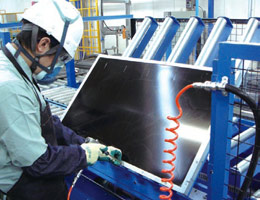Business trend:
Beginning in 2013,
Nippon Express (Nittsu) that is Japan’s largest transportation company will give
guidance to truck drivers about energy-saving driving in Vietnam to reduce CO2
emissions by 7%. The company plans to expand the grass-roots activities to
Indonesia and Thailand and ultimately wishes to apply the energy-saving driving
to hundreds of thousands of trucks it operates worldwide. It will use the
reduced amount as its emission allowances. It reckons that it will be able to
reduce about 950,000 tons of CO2 that it emitted in Japan in 2011 to nearly
zero should it introduce the energy saving driving to 200,000 trucks.
The guidance about
energy saving driving is under way in Malaysia. Based on the results in
Malaysia, the company reckons that it will be possible to reduce 5 tons of CO2
emissions per truck per year in Vietnam if the energy-saving driving technique
becomes widespread. Vietnamese drivers will be instructed to stop idling while
waiting for the green signal. In addition, trucks will be loaded with the
latest driving control system that tells where the driver made a hard stop and
sudden acceleration besides showing fuel consumption of each driver.
The green letters
show that the driver is
traveling in the energy-saving mode.
